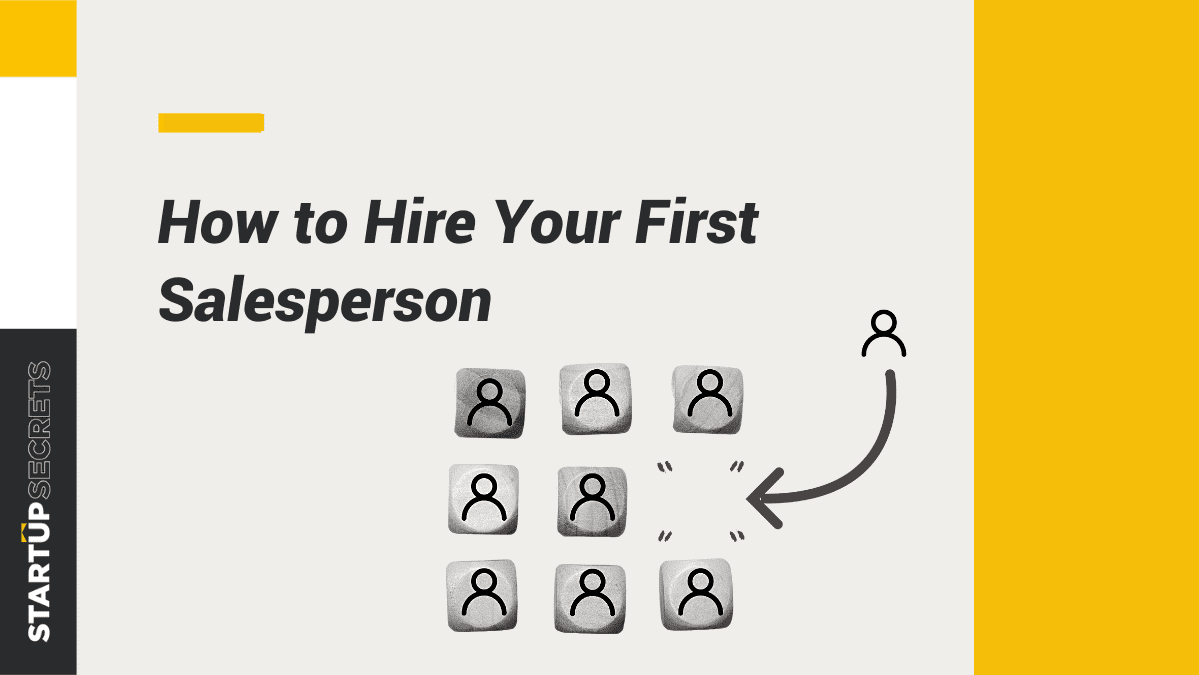Making your first sales hire is a challenge, especially if you don’t have sales experience. Should you hire an experienced leader? How about someone with specific industry experience? How do you determine whether a salesperson will succeed in your company?
“A lot of salespeople just want to hit their revenue targets—and they’re used to having a script and a process,” says Michelle Pietsch, Founding Partner at Minot Light Consulting. “But a lot more goes into revenue targets at an early-stage company. Most people don’t want to deal with all the noise.”
“Plus, when you get sales candidates in the door, they interview well because they can sell themselves,” says Channing Ferrer, CSO of SEMRush. “It’s easy to make a quick hiring decision based on personality, not what your business needs.”
To avoid these traps, consider the following guidelines.
Don’t Overvalue Experience at an Industry-Leading Company
“‘But they came from Salesforce!’ I often hear that from founders who’ve made a first sales hire that’s not working out,” says Michelle. It’s easy to be impressed by industry-leading brands. And being able to recruit someone from the “Google of Industry X” can feel like a big win.
“But if you take a salesperson from a big company with thousands of employees and stick them in a Seed-stage startup, that won’t work,” says Channing. “In a startup, you need grit, scrappiness, and a strong sense of ownership, because there are so many things to get done.”
In sales, that includes: cold calling, sourcing leads, tracking outreach, staying organized, and more. “At this stage, they need to build a sales playbook,” says Michelle. “Most of these hires aren’t willing to do the work because they’ve had people below them doing it all.”
But depending on your target customer, “They may also need to be able to negotiate with senior executives to close deals,” adds Channing. “This makes it hard to hire the right experience level.”
So what do you really need to look for?
Identify the Ability to Build a Sales Pipeline
In the early days, Michelle sees founders heavily rely on customer introductions from their investors. “That’s a mistake because that list will run dry,” she says.
“What’s working now won’t necessarily work in six to nine months,” she adds. “Your company and process are going to change. So get ahead of it, and identify multiple ways to build a pipeline that leads to revenue.”
Outbound
One of the top ways to do that is through outbound selling. At a more prominent company, salespeople may be able to wait for inbound opportunities driven by an established marketing team, but you’re mostly starting from scratch in the early stage.
“You need someone with self-sourcing experience,” says Channing. That includes being comfortable with the operational aspects of sales: setting up email sequences, staying organized, and keeping track of your outreach.
It also involves persistence. “A typical buyer doesn’t usually respond until eight to 10 touches, so a first sales hire must be comfortable with that,” says Channing. “You can’t shy away from ‘no.'”
“A lot of tech founders don’t understand what it takes to do outbound, and they want to see immediate results,” says Michelle. “But revenue from outbound takes time, so find someone to start it early.”
Inbound
While outbound is very important at this stage, you may get some inbound leads that need a response. Therefore, a first sales hire should have some experience managing inbound leads.
A handful of people might be signing up for a trial, demo, or whitepaper each month. “This is a different playbook,” says Michelle. And while conversations with inbound leads are typically easier, “you have to set and meet certain SLAs,” she adds. “Your turnaround time could be under 24, 12, or one hour. How do you handle chat requests?”
“Your first sales hire needs to be doing all these things while sourcing new leads simultaneously,” says Michelle. “They need the ability to shift focus. It’s ultimate multitasking, which is hard to do!”
Net-New Selling
Another caveat that Channing points out is that a salesperson might be doing well at an established company, but they could be primarily selling into existing customer accounts. “Net new and customer selling are different skill sets,” says Channing.
“It’s often easier to sell to existing customers,” says Michelle. “But early on, getting as many people using your tool is important. Focus on new logos and revenue, and then you can build account-based selling.”
Sample Interview Questions
- Please walk me through how you generate enough pipeline.
- How do you get most of your leads?
- What does your inbound motion look like today?
- When you hit a pipeline gap, what do you do?
- How do you look at your pipeline? Are you looking at it on a weekly or monthly basis?
- If you’re not getting enough inbound leads, what do you do?
- How do you manage sales outreach?
- What percentage of net-new customer deals are you selling?
What to Look For
“You’d be surprised by the number of people who say, ‘Oh, our marketing is bad. I don’t get enough leads,'” says Michelle. Instead, strong candidates need to be able to speak to the process they’ve used, how they’ve filled gaps in their pipeline, and talk about how they handle a “no” answer.
Ideally, at least 75% of their sales come from net-new accounts. At a minimum, 50% should be net-new.
Look for the Soft Skills Needed in a Startup
Identifying why someone wants to work at an early-stage startup is critical. “And that’s after you paint a very transparent picture about what it will be like,” says Michelle. “You don’t have a process; you don’t have a marketer—you’re just getting started.”
“It can’t be for free lunch or the ‘cool idea’ of working at a startup,” she adds. “Your comp plan might change three times this year. You might not get one at all. You have to be comfortable with a lot of unknowns.”
Because of that, you have to test a candidate’s ability to do something without any process or guidance. Typically, that requires the following characteristics.
Scrappiness
One of the most critical startup qualities to look for is scrappiness—when folks take the initiative to figure things out independently. They solve their problems without asking someone else to step in.
“When things don’t go your way, how do you handle it?” asks Michelle. “You might not have that VP with decades of experience to ask—you’re working with someone who’s never done it before.”
To determine this, find scenarios when they had to figure something out independently. Ask them about different life situations, either personal or professional. “You want to look for a sense of ownership,” says Channing. “If they say, ‘I solved it by having X person do Y thing,’ that’s a red flag.”
Adaptability
“The ability to think on your feet and adjust is always important for salespeople, but even more so at a startup,” says Channing.
Maybe an unknown stakeholder joins your sales demo, or you’re conversing, and the topic changes. “You’ve got to be able to adapt.”
Collaboration
“Early team members have to help others win to make the company successful in the long term,” says Michelle. “Collaborating and being part of a team help the organization reach the next level.”
Try to understand how candidates collaborate with others in the organization. Do they bounce ideas off of one another? Do they share tactics that are working?
Motivation
The next quality Channing looks for is innate motivation. “Successful salespeople always find a way to get things done,” says Channing. They need to show the desire to succeed and a willingness to put in the extra effort.
“A lot of this is innate, but you have to understand what motivates them.” This can go back into the early days of life, and they could draw on past examples from work, school, extracurriculars, or hobbies—anything that conveys innate motivation.
Sample Interview Questions
After all these questions, dig deeper. What happened? Why did they react the way they did? Again, ask for multiple examples, and look for a consistent approach.
- Tell me about a time when you were doing something for the first time. How did you go about it?
- Give me an example of an issue that came up while you were pursuing a deal. How did it get sorted out?
- Walk me through a time when you were stuck and didn’t have anyone to go to. What happened? How were you stuck?
- Walk me through a time you had a challenge in your sales cycle or with a prospect. How did you handle it?
- Tell me about a time when you went into a situation with a game plan, but halfway through, you had to think on your feet and quickly adjust.
- Tell me about a time when you were not successful. What happened, and how did you solve it?
- How do you learn from your peers?
- How often do you collaborate with peers? What is your avenue for that?
- Tell me about something you wanted to do well. How did you ensure that you did it well?
- When were you up against a wall, and how did you get out of that situation?
- Can you share an example of when you identified an issue and implemented a solution?
- Walk me through your biggest challenge in your role today.
What to Look For
“When asked about their biggest challenge, you’d be surprised at how open people get,” says Michelle. “This is where you can see if they’re ready for a startup.”
Common “Red-Flag” Answers:
- Lack of process: “I have to send proposals to five people. It takes too long, and there’s no process for it.”
- Change: “It’s frustrating because my comp plan changed twice this year. And I have no metric-driven goals.”
- Lack of support: “I don’t get any coaching. We don’t do any role plays.”
- Lack of tools: “We don’t have X tool.”
At an early-stage startup, you’re not going to have these things. “If the challenge is a complaint, and they haven’t done anything to get past it, that’s a red flag,” says Michelle.
“Handling challenging situations is what sales is all about,” says Channing. “You need people who don’t just give up.”
For example, Michelle recently interviewed a candidate whose biggest challenge was that he had never been trained in email sequences. Even so, he had to send out 100 automated emails every week. However, they weren’t getting replies, so he knew it wasn’t the most effective channel.
Instead, he resorted to using the phone. “He was told to do one thing, but he took the initiative to try a different strategy and was successful,” says Michelle. “Plus, not many people are willing to pick up the phone. That stood out.”
Align on Long-Term Career Goals
Asking career progression questions early on helps determine if a candidate wants to be there for the long run. For example, what type of salesperson do they want to be?
‘If they say, ‘I want to be in enterprise sales,’ that might not be the right fit,” says Michelle. “Your company has a long way to go before that’s possible.”
If they say they want to be a sales leader, Michelle usually tries to talk them out of it. “It’s not an easy job, so I make it sound kind of unpleasant to see if they really want it.”
Don’t forget that your first sales hire will likely help interview and onboard the next hires. “They might not have management experience, but if they want leadership and mentorship, they can scale into that role,” says Channing.
Sample Interview Questions
- What are your long-term career aspirations?
- What makes you think you’ll be a good leader?
- What has set you up for success?
- Who is your favorite sales leader, and why?
- What makes a good or bad sales leader?
- Can you tell me about a time you mentored someone?
- How did that go? What did you do?
- Is there anything you liked or disliked about it?
What to Look For
“Look for someone who took a teammate under their wing without being asked,” says Michelle. “New hires will come on board with a founder who doesn’t know how to lead salespeople. So what are you going to do? Let them fail, or help them through?”
To Channing, this could also sound like: “I guided this person through X challenge. Here’s how we approached it, and this was the result. It was rewarding because of Y and Z.”
Plan Your Interview Process
Before diving into this process, step back and get things in order. First, you’ll need a few tools to review candidates consistently and look for the right qualities.
This also gives you the space to think about who should interview them, how you’ll create a scorecard to rate them consistently, and a “homework” assignment to assess their skill set.
Hiring Scorecard
The first thing to do is to determine what characteristics you need in a first sales hire. Then, outline these characteristics in a hiring scorecard to review candidates consistently.
From Michelle’s perspective, that includes:
- Company values: Will they be aligned?
- If you haven’t articulated them, do that first.
- Culturally additive: Will they thrive in and add to your culture?
- The right skillset: Can they be successful in the job?
- Long-term alignment: Will they be good for this company long-term?
→ See our complete guide on how to design an effective interview process.
Michelle recommends having candidates interview with at least three people, with one discussion focused on culture, one on skill set, and one on long-term alignment.
Homework Assignment
A great way to test a first sales hire’s skills—and motivation—is to assign a prospecting email, presentation, or sales call role-play. This exercise could take 45 minutes to an hour and would depend on the size of your company, the number of people involved, who you’re selling to, how complex your sales cycle is, how technical the audience is, etc.
“You’d be surprised at how many people don’t respond when asked to do a homework assignment,” adds Michelle. “That gives you a clear indication of how badly they want to work for your company.”
What to Look For in Their Assignment:
- Can they tell a story?
- Is their communication free of grammatical errors?
- Can they organize a document?
- “They’re going to be putting together content themselves—there’s no one else to do that,” says Michelle. “So what does it look like?”
- Can they hold a conversation with and educate someone at the C-level?
- Do they send a tailored follow-up email?
- “If there’s no meat to it and it’s generic, that’s a red flag,” says Michelle. “They should call out specifics.”
Do Your Due Diligence
Lastly, before you make an offer to a candidate, do your due diligence on them. “A lot of early founders don’t do this,” says Michelle. “The other day, I checked a candidate’s LinkedIn and noticed that he had been job hunting for six months but had told the CEO he was currently working at his company. Things like this happen more than you’d expect.”
This due diligence can include the following:
- Look at their social media profiles.
- Compare their resume to their LinkedIn.
- Review their activity on LinkedIn and Twitter.
- Read Glassdoor reviews on their previous company.
For example, if the company has excellent reviews, but the candidate has complained, “that’s a red flag,” says Michelle.
References are helpful, but they’re usually going to be positive. So instead, Michelle recommends finding some backdoor references in your network. “It doesn’t need to be about the individual,” she adds. “Ask for intel about the company—any relevant info about what their experience could have been like.”
You could ask:
- What stage is the company at?
- What is their sales cycle?
- What is their process like?
- What was their management like?
Remember, salespeople are good at selling themselves, so any information you can gather helps you cover your bases.
Set the Right Expectations
Lastly, as your first sales hire starts, remember that onboarding and ramping up take a while. “They’re not going to be able to sell as much as the CEO right off the bat,” says Channing.
Setting a quota for a new sales hire at an early-stage company can also be challenging. “Quota might not be the right metric initially, but you must set metric-driven goals.”
He recommends focusing on activity:
- How many companies are we going after?
- How many opportunities are we setting up?
As their productivity increases, goals can—and should—evolve. And over time, when you’ve made a strong hire, they’ll continue to grow with your company.









